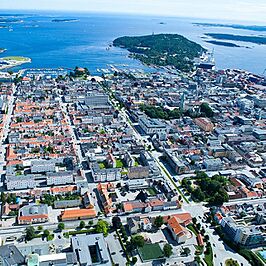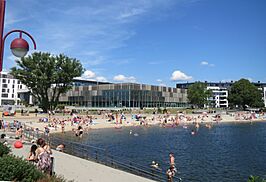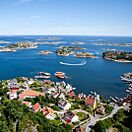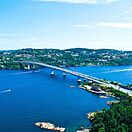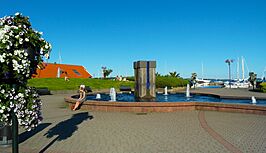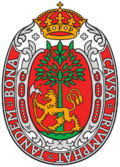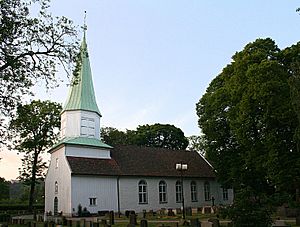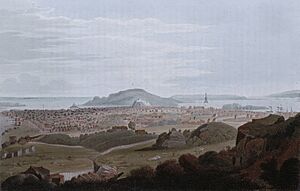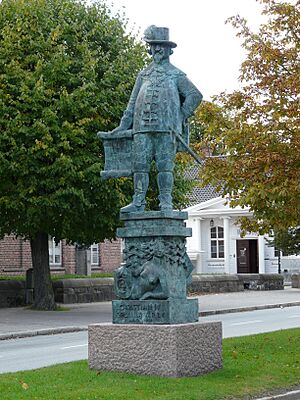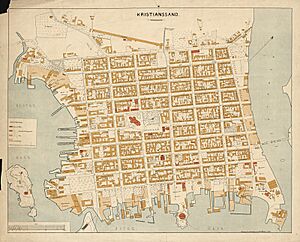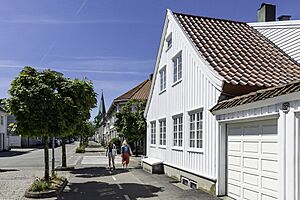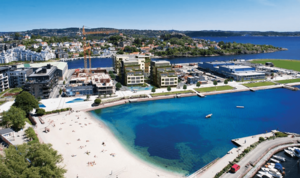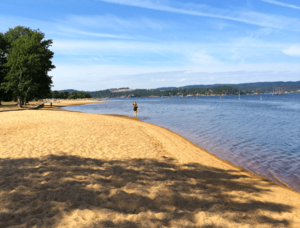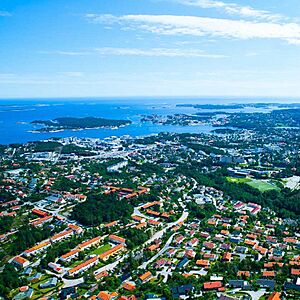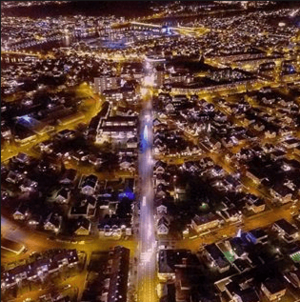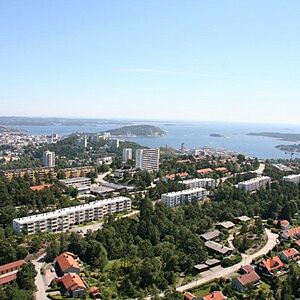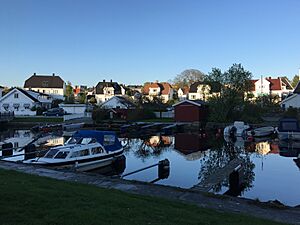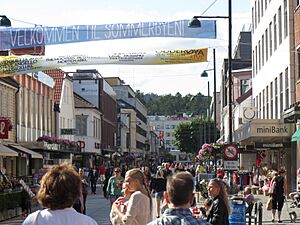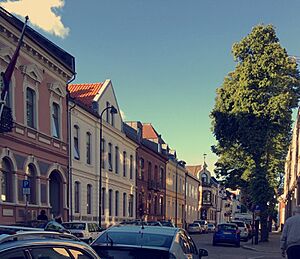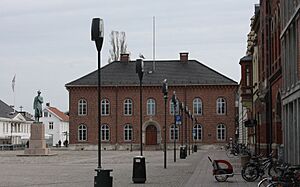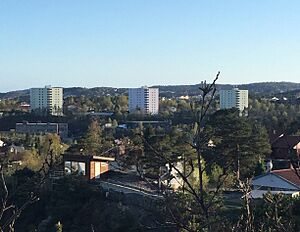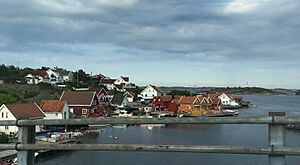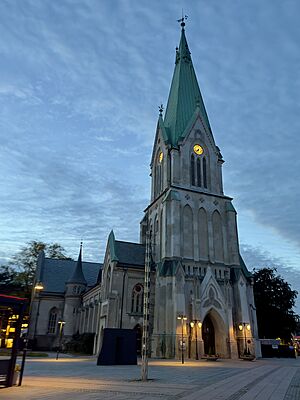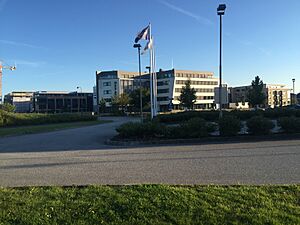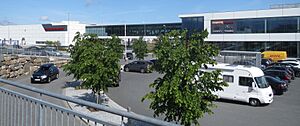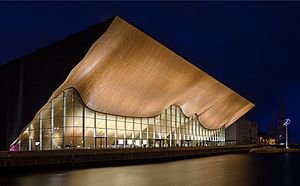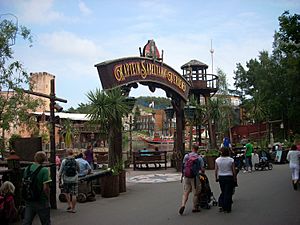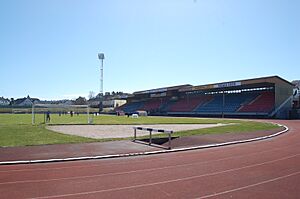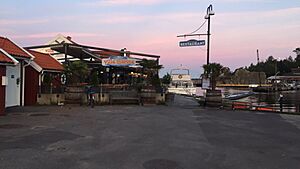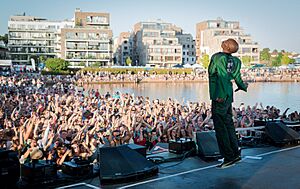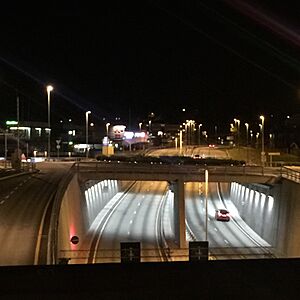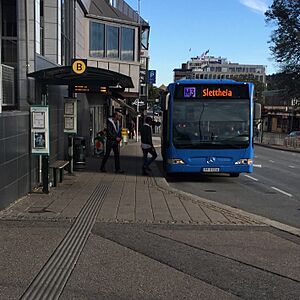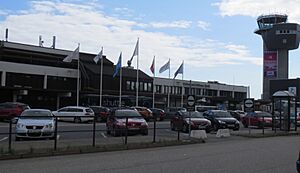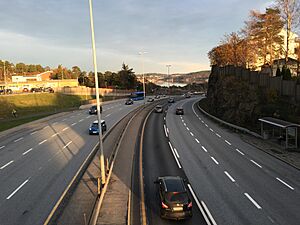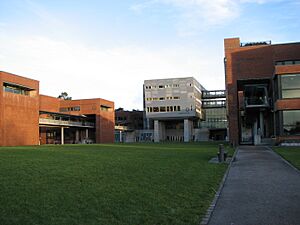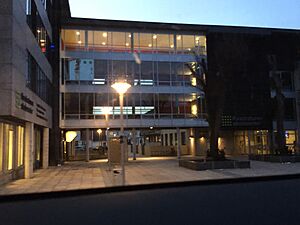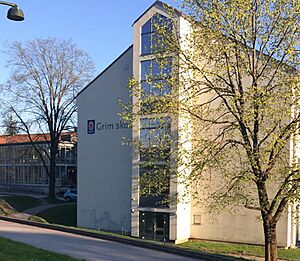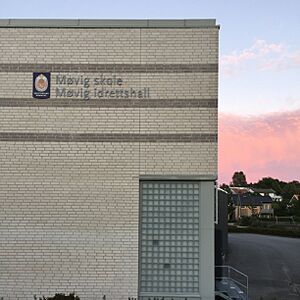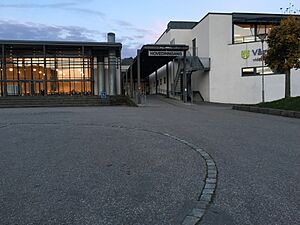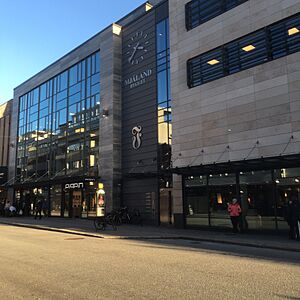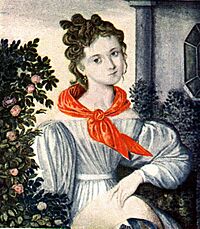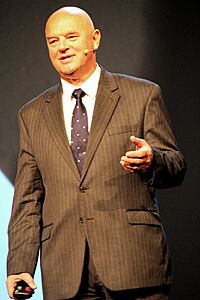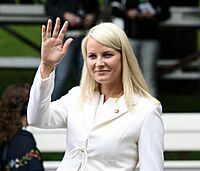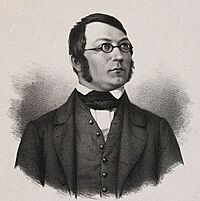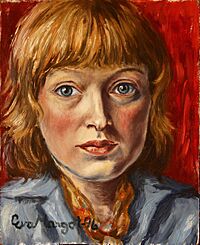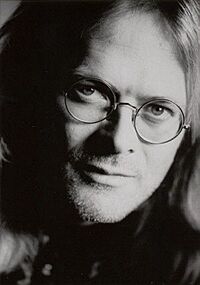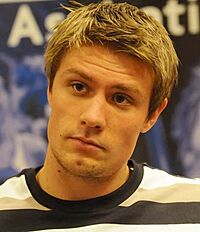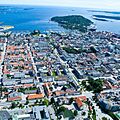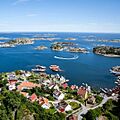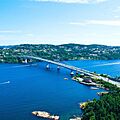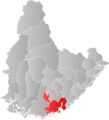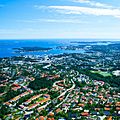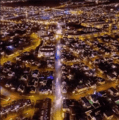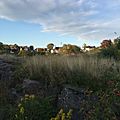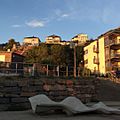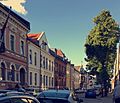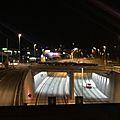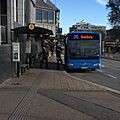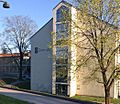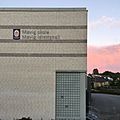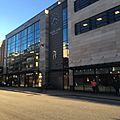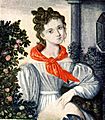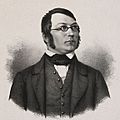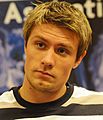Kristiansand facts for kids
Quick facts for kids
Kristiansand Municipality
Kristiansand kommune
|
|||
|---|---|---|---|
|
City and municipality
|
|||
|
|||
| Nickname(s):
Port of Norway
|
|||
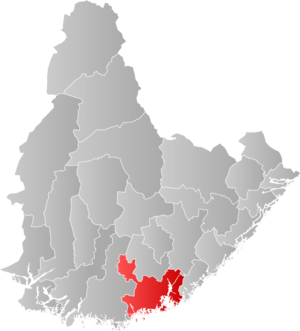 |
|||
| Country | |||
| Municipality | Kristiansand | ||
| County | Agder | ||
| District | Kristiansandregionen | ||
| Established | 1641 | ||
| Area | |||
| • City and municipality | 428.21 km2 (165.33 sq mi) | ||
| • Urban | 25.03 km2 (9.66 sq mi) | ||
| • Metro | 1,892.8 km2 (730.8 sq mi) | ||
| Population
(31 December 2022)
|
|||
| • City and municipality | 115,569 |
||
| • Urban | 125,000 | ||
| • Urban density | 4,994/km2 (12,930/sq mi) | ||
| • Metro | 155,648 | ||
| • Metro density | 82.2316/km2 (212.979/sq mi) | ||
| • Municipality/Urban rank | 6th/8th | ||
| • Metro rank | 5th | ||
| Demonym(s) | Kristiansander, Kristiansandar | ||
| Time zone | UTC+01:00 (CET) | ||
| • Summer (DST) | UTC+02:00 (CEST) | ||
Kristiansand is a city and municipality in Agder county, Norway. It is the fifth-largest city and sixth-largest municipality in Norway. As of January 2020, about 116,000 people live here. This number grew after the nearby areas of Søgne and Songdalen joined Kristiansand.
Besides the main city, Kristiansand includes other busy areas. These are Skålevik in Flekkerøy, Strai in Grim, Justvik in Lund, and Tveit in Oddernes. The city is split into five main parts called boroughs. These are Grim, Kvadraturen (the city center), Lund, Søgne, Oddernes, and Vågsbygd. Vågsbygd is the biggest borough with about 36,000 people.
Kristiansand is connected by four main roads. The E18 comes from Oslo in the east. The European route E39 connects from Stavanger and coastal towns in the west. Norwegian National Road 9 comes from Setesdal. And Norwegian National Road 41 links from Telemark and the airport. The Varodd Bridge is a large bridge on the E18 that crosses the Topdalsfjorden.
Tourism is very important in Kristiansand, especially in summer. Kristiansand Zoo and Amusement Park is Norway's largest zoo. It welcomes over 900,000 visitors each year. Markens Street is the main shopping street in downtown Kristiansand. Bystranda is a city beach, and Hamresanden is the longest beach. Hamresanden Camping is a popular spot for families in summer. The city also hosts free concerts downtown during the summer. Just outside the city is Sørlandsparken, a large industrial park with Sørlandssenteret, Norway's biggest mall.
Contents
- City Name and Meaning
- City History
- City Symbol: Coat-of-Arms
- Geography and Nature
- People and Population
- Economy and Business
- Culture and Arts
- Sports and Activities
- Tourism and Fun Things to Do
- Transportation and Travel
- Education and Learning
- Media and News
- Famous People from Kristiansand
- Sister Cities
- Images for kids
- See also
City Name and Meaning
The city was named after King Christian IV. He officially founded the city on July 5, 1641. The second part of the name, sand, means "sand" or "sandy ground" in Old Norse. This refers to the sandy area where the city was first built.
Historically, the name was spelled Christianssand until 1877. Then, an official change made it Kristianssand to match Norwegian spelling rules. Other cities like Kristiansund and Kristiania (now Oslo) also had their names changed. In 1889, the name changed again to its current form, Kristiansand, with one "s".
In 2012, the city's mayor suggested changing the name back to Christianssand. He felt it honored tradition. However, most local people did not like this idea, so the change did not happen.
City History
Early Times and Settlements
People have lived in the Kristiansand area for a very long time. In 1996, a well-preserved skeleton from about 6500 BC was found in Søgne. This shows that people lived here thousands of years ago. Grauthelleren, a cave on Fidjane, is thought to be a Stone Age settlement.
In 2010, a special Stone Age site was found at Hamresanden. It dates back to around 3400 BC. Digs near Oddernes Church have found old farming villages from before and after the year 0. These villages are special in Norway, as most ancient Norwegian settlements were single farms. Other finds around the church show people lived there from about 400 AD. A royal center might have been at Oddernes before 800 AD, and the church was built around 1040.
Before the stone church, there might have been one or two wooden churches on the same spot. Old graves found near the church show that the area had a large population before the Black Death.
In the 1300s and 1400s, there was a busy port and a small village on the Otra River. The harbor on Flekkerøy island was also very important from the 1500s. It was first made stronger by King Christian III in 1555.
Founding and Growth to 1900
King Christian IV visited the area in 1630 and 1635. On July 5, 1641, he officially founded the town of Christianssand. He planned the town with a grid pattern, which is now the central area called Kvadraturen. Merchants from all over Agder were told to move to the new town. In return, they got special trading rights and did not have to pay taxes for ten years.
In 1666, Christianssand became a military town with strong defenses. In 1682, King Christian V moved the main church office (bishopric) from Stavanger to Kristiansand. This made the young city an important center.
The city had a big fire in 1734, which caused a lot of damage. Later in the 1700s, after the American Revolutionary War, the city's shipbuilding business grew. This boom lasted until the Napoleonic Wars, when a British naval blockade hurt Kristiansand's trade. Norway supported France, so British ships blocked Norwegian ports. The city's economy started to get better in the 1830s. The growth of Norway's shipping industry was very important. Kristiansand was the only place in Norway where oak trees grew well, which was key for shipbuilding. By 1848, about 12,000 people lived in Kristiansand.
In 1838, a new law gave cities like Kristiansand their own local government. The city was surrounded by the rural area of Oddernes.
Kristiansand had a special quarantine station and hospital on Odderøy Island for cholera patients. This helped the city have fewer deaths from the disease than other areas.
Another important event in the 1800s was the opening of a psychiatric hospital in 1881. This hospital brought skilled doctors to the city and created many jobs for women.
The last major fire in 1892 destroyed half of the old city center. It even reached the Kristiansand Cathedral, which had been rebuilt after an earlier fire in 1880.
From 1900 to Today
With new ways to make power from water (hydropower), Kristiansand slowly developed more industries. A nickel refinery opened in 1910, which is now Glencore Nikkelverk. The First World War was good for Kristiansand because it was a neutral shipping city. But the economic problems of the 1920s and 1930s also affected the city.
In 1921, Kristiansand grew by adding part of the nearby Oddernes area. This added more land and residents.
Kristiansand was attacked by German forces on April 9, 1940, during World War II. The Norwegian coastal defenses at Odderøya fought back strongly. Bombs hit the downtown area and the church tower. The city was eventually taken by 800 German soldiers.
In 1965, Kristiansand merged with the nearby areas of Randesund, Tveit, and Oddernes. This made the Kristiansand Municipality much larger.
After the war, the Lund area continued to grow. In the 1960s and 1970s, Vågsbygd in the west was developed into a large area with 20,000 people. In the 1980s, industries in the city faced challenges. But from the mid-1990s, businesses grew again, especially those making equipment for marine and offshore oil industries.
On January 1, 2020, Kristiansand merged with the neighboring municipalities of Songdalen and Søgne. This created one very large Kristiansand municipality.
City Symbol: Coat-of-Arms
The official symbol of Kristiansand was approved on December 8, 1909. It is based on the city's oldest seal from 1643. In 1643, King Christian IV allowed the new town to use a seal with the Norwegian lion and the royal crown. The crown shows that the king founded the city.
Another important part of the symbol is a tree. The type of tree is not specific, so there are different versions. An older seal from 1658 shows a tree with leaves and what look like pine cones. At the bottom of the crown are the letters R. F. P., which stand for Regna Firma Pietas. This means "Piety strengthens the realm," and it was King Christian IV's motto. The city's own motto, Cavsa Triumphat Tandem Bona, means "A good cause prevails in the end."
Geography and Nature
Kristiansand is located in a very important spot on the Skagerrak sea. For centuries, it was a military stronghold. It was a royal home for Harald Fairhair, then a Danish-Norwegian fortress, and later a military town. Kristiansand is a key connection point to and from Europe. It has ferry services to Denmark and is the end of the railway line along southern Norway.
Near the city, you can find deep woods. In Baneheia and on the old fortress island of Odderøya, there are lighted trails for skiing and walking paths. These paths are even made for wheelchair users.
Two major rivers, the Otra and the Tovdalselva, flow into the Skagerrak at Kristiansand.
Weather in Kristiansand
Kristiansand has a mild ocean climate. The coast of the Skagerrak, including Kristiansand, is the sunniest part of Norway. Snow usually falls in late December, January, and February. It can be heavy, but it rarely stays long on the coast. In recent years, snow often melts after a few days.
In summer, many locals go to the Fiskebrygga (Fish Wharf), the islands opposite the city, and Hamresanden Beach. Hamresanden Beach is about 10 minutes from the city center. People from other European countries also visit this beach in summer.
The highest temperature ever recorded at Kristiansand airport was 32.6°C in August 1975. The lowest was -28.2°C in January 1982. Temperatures rarely reach 30°C, but most days in July are 21°C or warmer. July 2018 was the sunniest month ever, with 422 hours of sunshine.
Popular Beaches
- Bystranda is a beach right in the city center. It is next to the Aquarama swimming complex, which has indoor and outdoor pools. The Scandic Hotel Bystranda, Southern Norway's largest hotel, is also nearby. Bystranda has beach volleyball, playgrounds, skateparks, and easy access for people with disabilities. There is a sculpture in the water in the middle of the bay. Palmesus is a yearly beach festival held here. It is Scandinavia's largest beach festival.
- Hamresanden is located between Hånes and the airport. It is 3 kilometers long, making it the longest beach in Kristiansand. There are three camping sites and an apartment hotel at the beach.
City Parts and Areas
Kristiansand is divided into 5 boroughs and 18 smaller parts.
- Kvadraturen is the city center. It was originally a sandy plain with forest. King Christian IV planned the city center with 56 rectangular blocks. The areas along the Otra River and the harbors were built first. Today, the Posebyen area in Kvadraturen has the longest continuous row of wooden buildings in Northern Europe. Important places here include Kristiansand Cathedral, Kristiansand City Hall, Wergeland Park, and the ferry terminal to Hirtshals.
- Vågsbygd has many industries. The largest employer is Elkem Solar, which makes very clean silicon for solar cells. On Andøya, there is a big industry that makes cranes and other equipment for the worldwide oil industry. Amfi Vågsbygd is a large shopping center.
- Lund is the second largest borough. Traces of human life from the Iron Age and Viking Age have been found here. A runestone at Oddernes Church tells about an old farm. In 1492, robbers attacked Lund, causing violence and casualties.
- Randesund is located between Kvåsefjorden and Topdalsfjord. Several small islands are off the coast, like Randøya and Herøya, which are popular in summer. The name Randesund comes from "rand" (boundary) and "sund" (strait).
- Tveit is a village and a former municipality. It is home to Kristiansand Airport, Kjevik. Tveit is along the lower part of the Tovdalselva river.
Neighboring Areas that Joined Kristiansand
- Søgne is a former municipality west of Kristiansand. It merged with Kristiansand and Songdalen on January 1, 2020.
- Songdalen is a former municipality northwest of Kristiansand. It also merged with Kristiansand and Søgne on January 1, 2020.
Important Streets
- Dronningens gate (Queen's Street) runs from the harbor to Lund Bridge. It was once called Sand Alley.
- Elvegata (River Street) has a mix of new businesses, homes, schools, and older wooden buildings.
- Festningsgata (Fortress Street) is named after Christiansholm Fortress from 1672. It was originally called Northern Gate.
- Henrik Wergelands gate is named after the famous Norwegian poet Henrik Wergeland, who spent his early childhood here.
- Tollbodgata (Tollbooth Street) runs from the harbor to the Otra River. It was once called Sten Alley.
- Vestre Strandgate (Western Beach Street) is a main street with hotels, theaters, cinemas, and the bus and train stations. It has many restaurants and shops.
People and Population
Kristiansand has a diverse population. The largest minority groups come from Poland, Vietnam, and Iraq.
The areas with the highest percentage of immigrants are Slettheia (36%), Kvadraturen (24%), and Grim (22%).
The areas with the lowest percentage of immigrants are Flekkerøy (7%), Randesund (7%), and Gimlekollen (8%).
Religion in Kristiansand
- Christianity: Kristiansand Cathedral is the largest church in the city. It was built in 1885 and can hold 1500 people. It is the main church for the Diocese of Agder og Telemark. Other churches include Grim Church, Vågsbygd Church, Lund Church, and Søm Church. Søm Church was built in 2004 and has windows designed by Kjell Nupen. There are also churches in Flekkerøy, Hellemyr, Hånes, Justvik, Randesund, Strai, Tveit, and Voie. Kristiansand also has a Catholic church (St. Ansgar's), a Latter-day Saint church, and an Orthodox church.
- Buddhism: There is a Buddhist center in Vågsbygd. Another meditation center is in the neighboring Songdalen municipality.
- Islam: There is a mosque in Kvadraturen.
Economy and Business
- Christianssands Bryggeri is a company that makes beer and soft drinks. It started in 1859. All their products use spring water from their own spring, called Christian IVs kilde.
- Hennig-Olsen Iskremfabrikk is an ice cream factory based in Kristiansand. The factory opened in 1960, but the Hennig-Olsen family has been making ice cream since 1924.
- Glencore Nikkelverk (nickel factory) was founded in 1910. It is owned by the company Glencore and has about 500 employees.
- The Korsvik industrial area has companies that make drilling technology, cranes, and other equipment for the worldwide oil industry.
- Elkem makes silicon for solar cells. It has about 225 employees.
- Sørlandschips is a Norwegian potato chip brand. It is one of Norway's most popular chip brands.
- Dampbageriet is a large bakery chain that started in Kristiansand in 1862.
- Sparebanken Sør is a savings bank that started in 1824. It was one of the first banks in Norway.
- Hennig-Olsen Iskremfabrikk is a major Norwegian ice-cream company based in Kristiansand.
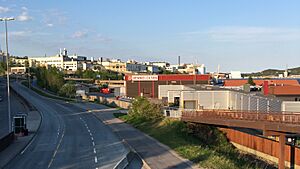
Kristiansand used to have many shipbuilding companies, but fewer exist today. The Rasmussen Group, once a shipping company, is now an investment company. Kristiansand still has important shipbuilding and repair facilities that support Norway's North Sea oil industry.
Kristiansand Dyrepark (Kristiansand Zoo) is known for selling the most giraffes in Europe.
Sørlandsparken: Business and Fun
Sørlandsparken (The Southern Norway Park) is a large area for businesses and shopping outside Kristiansand. It covers 670,000 square meters and has over 5,000 jobs.
The main part of Sørlandsparken is in Kristiansand. It includes Sørlandssenteret, which is Norway's largest mall with 195 stores. Kristiansand Zoo and Amusement Park, Norway's largest zoo, is also here. The racetrack of Southern Norway is in Kristiansand. IKEA is technically in the nearby Lillesand municipality.
The E18 highway passes Sørlandsparken on its way to downtown Kristiansand. Buses run frequently to the park throughout the day.
Culture and Arts
The Kristiansand Symphony Orchestra performs at the Kilden Performing Arts Centre. Kilden opened in January 2012 and is also the new home of Agder Theatre.
Sørlandets Art Museum is in the center of Kristiansand. It opened in 1995 and is the second-largest regional art museum in Norway. It shows both fine art and crafts. It also has programs for schools and children.
Kristiansand Kunsthall, an art association founded in 1881, is one of the oldest and largest in Norway. It has a large space for showing modern art.
In 2007, Kristiansand was named Norges kulturkommune (Norway's culture municipality). This award is given every two years.
Fiskebrygga is an old fish market area. It was updated in the 1990s and now has restaurants and shops, including a fish market. It is very popular in summer.
The island of Odderøya used to be a fortress. Now, it is used for recreation and outings. Sometimes, concerts and festivals are held there.
The city's millennium celebration was held at Tresse - Retranchement. This is a city park in front of Christiansholm Fortress.
Sports and Activities
The city's most famous football team is IK Start. In 2007, they moved to a new home stadium called Sør Arena. Other football teams in the city include Flekkerøy IL, FK Vigør, IK Våg, and FK Donn.
Kristiansand is also known for its handball teams (Kristiansands IF and Vipers Kristiansand), ice hockey (Kristiansand Ishockeyklubb), basketball (Kristiansand Pirates), and volleyball (Grim VBK) clubs. It even has a baseball team called Kristiansand Suns.
The Idda Arena, opened in 2011, is a multi-purpose hall. It has facilities for ice hockey, curling, martial arts, fencing, dance, and a gym. Next to it is a skate park and a football pitch.
Kristiansand Stadion is a multi-use stadium that used to be the home of IK Start. It has hosted important athletics events.
Motorcycle speedway has a long history in the city. The Norwegian Championship was held at Idda Idrettsplassen in 1960 and at Kristiansand Stadion in 1964. A new speedway track, Sørlandsparken Speedwaybane, was built outside the city. It has hosted the Norwegian Championships in 2012 and 2016.
Tourism and Fun Things to Do
Kristiansand is a popular summer place for tourists. Many visitors come to its zoo, Kristiansand Zoo and Amusement Park, which is just east of the city. It is the second most visited attraction in Norway. In 2012, it had 925,000 visitors. The zoo has animals like wolves, tigers, lions, and lynx, often in natural-like habitats. The zoo is open all year, but the amusement park is only open in summer.
The Quart festival was an annual music festival held in Kristiansand in early July. It had big stages on Odderøya and smaller ones around the city. It started in 1991 and became very popular, featuring international artists. For several years, it was Norway's largest music festival. The festival went bankrupt in 2008 and again in 2009.
Kristiansand also hosts many other festivals throughout the year. The Protestfestival, held in September, started in 2000. It aims to encourage discussion about politics and includes debates, concerts, and lectures. Other festivals include Southern Discomfort, Bragdøya Blues Festival, Dark Season Festival, Cultural Night, and the Kristiansand International Children's Film Festival.
Transportation and Travel
Kristiansand is an important place for travel and communication. It connects to Europe by air and sea.
Travel by Sea
From the city center, ferries go to Hirtshals in Denmark. Color Line operates the MS Superspeed 1, which takes about 3 hours and 15 minutes. It runs all year, twice a day each way. Fjord Line operates the HSC Fjord Cat, a fast catamaran that takes about 2 hours and 15 minutes. This ship only runs during the busy summer season.
A new catamaran will replace Fjord Cat in summer 2020. It will double the capacity and keep the same travel time.
In April 2022, a new ferry service started to Eemshaven, Netherlands.
Travel by Road
The E18 is the largest highway in Kristiansand. It continues through Norway to Oslo and then to Stockholm, Sweden. The E39 starts in Trondheim and follows the coast before going to the harbor in Kristiansand and continuing to Denmark. Norwegian National Road 9 starts in Kristiansand and goes north through Setesdal. Norwegian National Road 41 starts in Hånes and goes to Kristiansand Airport, Kjevik.
Travel by Bus
Buses in Kristiansand are run by Boreal Buss AS. All regional bus lines stop in Kvadraturen. Some bus lines go from the west coast to the east coast of the city.
Kristiansand Bus Terminal is the main bus station. It is near the train station. It has local, regional, and long-distance buses to Oslo, Stavanger, and Haukeli. A new bus terminal was built in 2019.
Local city buses have their main stops in Kvadraturen. Many lines connect different parts of the city, like Vågsbygd, Lund, and Grim, to the city center.
Travel by Train
Kristiansand Station opened in 1895 and is in the city center. The Sørlandet Line goes through small towns in Agder counties. Express trains go east to Oslo S. Regional trains go to Stavanger.
Travel by Air
The local airport, Kjevik, is 12 kilometers east of the city center. It has flights to cities in Europe and Norway. A new parking garage was built in 2019.
Distances to Other Cities
- Mandal: 36 kilometers
- Evje: 49 kilometers
- Arendal: 55 kilometers
- Stavanger: 160 kilometers
- Oslo: 250 kilometers
- Bergen: 292 kilometers
- Copenhagen: 391 kilometers
Education and Learning
The University of Agder started in 2007. It has about 10,000 students, with 7,500 in Kristiansand. The university offers many types of studies. It is located on a campus in the Lund area.
Noroff University College is a private university that opened in 2012. It offers special degrees in Interactive Media (Games or Animation), Applied Data Science, and Digital Forensics. Noroff also has online courses.
Kristiansand has a long history of education. Kristiansand Cathedral School was founded in 1684. Today, there are four public high schools: Kristiansand Cathedral School Gimle, Vågsbygd High School, Kvadraturen skolesenter, and Tangen High School.
Private high schools include Sonans utdanning. The private Sørlandets Maritime Senior Secondary School is also in Kristiansand. This school trains students for maritime jobs on a training ship called MS Sjøkurs.
Kristiansand also has an International School. It opened in 2008 and teaches students from grade 1 to 10 in English. In 2014, it moved into a new building.
Schools in Kristiansand
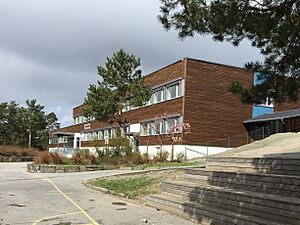
| Name | Type | District | Students | Status |
|---|---|---|---|---|
| Dvergsnes skole | Elementary | Oddernes | 360 | Public |
| Fagerholt skole | Elementary | Lund | N/A | Public |
| Fiskå skole | Junior High | Vågsbygd | 300 | Public |
| Flekkerøy skole | Elementary | Vågsbygd | N/A | Public |
| Grim skole | Junior High | Grim | 500 | Public |
| Haumyrheia skole | Junior High | Oddernes | 300 | Public |
| Havlimyra skole | Junior High | Lund | N/A | Public |
| Hellemyr skole | Elementary | Grim | N/A | Public |
| Holte skole | Junior High | Oddernes | 250 | Public |
| Hånes skole | Elementary | Oddernes | N/A | Public |
| Justvik skole | Elementary | Lund | N/A | Public |
| Karl Johan minneskole (memorial) | Elementary | Grim | 250 | Public |
| Karuss skole | Elementary and Junior High | Vågsbygd | N/A | Public |
| Kongsgård skolesenter | Elementary | Lund | 900 | Private |
| Kringsjå skole | Elementary | Randesund | N/A | Public |
| Krossen skole | Elementary | Grim | N/A | Public |
| Kristiansand Cathedral School | High School | Lund | 1,360 | Public |
| Kristiansand International School | Elementary and Junior High | Lund | N/A | Private |
| Kvadraturen skolesenter | High School | Kvadraturen | 1,500 | Public |
| Lindebøskauen skole | Junior High | Vågsbygd | N/A | Public |
| Lovisenlund skole | Elementary | Lund | N/A | Public |
| Mosby skole | Elementary | Mosby | N/A | Public |
| Møvig skole | Junior High | Vågsbygd | 400 | Public |
| NLA Mediehøgskolen Gimlekollen | College | Lund | 130 | Private |
| Oddemarka skole | Junior High | Lund | N/A | Public |
| Prestheia skole | Elementary | Lund | N/A | Public |
| Sjøstrand skole | Elementary | Vågsbygd | N/A | Public |
| Slettheia skole | Elementary | Vågsbygd | N/A | Public |
| Solholmen skole | Elementary | Grim | 200 | Public |
| Steinerskolen | Elementarty and Junior High | Lund | N/A | Private |
| Strømme skole | Elementary | Oddernes | 370 | Public |
| Sørlandets maritime videregående skole | High School | MS "Sjøkurs" | 60 | Private |
| Tangen vidergående | High School | Kvadraturen | 1,000 | Public |
| Tordenskjoldsgate skole | Elementary | Kvadraturen | 150 | Public |
| Torkelsmyra skole | Elementary | Vågsbygd | N/A | Public |
| Torridal skole | Elementary and Junior High | Grim | N/A | Public |
| Universitetet i Agder | University | Lund | 11,500 | Public |
| Vardåsen skole | Elementary | Oddernes | 350 | Public |
| Ve skole | Elementary and Junior High | Oddernes | N/A | Public |
| Vigvoll skole | Junior High | Oddernes | 200 | Public |
| Voiebyen skole | Elementary | Vågsbygd | N/A | Public |
| Vågsbygd skole | Elementary | Vågsbygd | 270 | Public |
| Vågsbygd vidergående | High School | Vågsbygd | 800 | Public |
| Frank Wild Minneskole (memorial) | Elementary | Lund | N/A | Public |
| Øvre Slettheia skole | Elementary | Vågsbygd | N/A | Public |
| Åsane skole | Elementary | Vågsbygd | N/A | Public |
Media and News
Fædrelandsvennen is the main newspaper in Kristiansand. It has about 116,000 readers daily and started in 1875. In 2006, it changed from a large format to a smaller tabloid size. The newspaper has offices in downtown Kristiansand.
Kristiansand Avis (Kristiansand Newspaper) is a free newspaper. It is delivered to homes in the region every Thursday. It focuses on local news.
NRK Sørlandet has its main office in Kristiansand. It is the local office for the national broadcasting channel NRK. NRK Sørlandet covers the Agder counties. They produce radio, television, and online news for Southern Norway.
Famous People from Kristiansand
Public Service and Thinkers
- Camilla Collett (1813–1895), considered Norway's first feminist and a writer.
- Bernt Balchen (1899–1973), a famous polar aviator and engineer.
- Jan Vincents Johannessen (born 1941), a doctor, cancer researcher, painter, and composer.
- Mette-Marit, Crown Princess of Norway (born 1972), the Crown Princess of Norway.
Artists and Performers
- Henrik Wergeland (1808–1845), a famous Norwegian writer, poet, and playwright.
- Jens Bjørneboe (1920–1976), a novelist, writer, and painter.
- Terje Formoe (born 1949), a singer, songwriter, and actor.
- Rolf Løvland (born 1955), a Norwegian composer and pianist.
- Kjell Nupen (1955–2014), a modern artist known for painting, sculpture, and graphics.
- Anne Lilia Berge Strand (born 1977), known as "Annie", a singer-songwriter.
- Agnes Kittelsen (born 1980), an actress.
Sports Stars
- Katrine Lunde (born 1980), a handball goalkeeper and Olympic champion.
- Kristine Lunde-Borgersen (born 1980), a handball player and Olympic champion (twin sister of Katrine Lunde).
- Andreas Thorkildsen (born 1982), a javelin thrower who won Olympic gold medals in 2004 and 2008.
Sister Cities
Kristiansand is connected with these cities around the world:
- Gdynia, Poland
- Kerava, Finland
- Letchworth, England, United Kingdom
- Münster, Germany
- Orléans, France
- Rajshahi, Bangladesh
- Reykjanesbær, Iceland
- Trollhättan, Sweden
- Walvis Bay, Namibia
Images for kids
See also
In Spanish: Kristiansand para niños
 | Kyle Baker |
 | Joseph Yoakum |
 | Laura Wheeler Waring |
 | Henry Ossawa Tanner |


